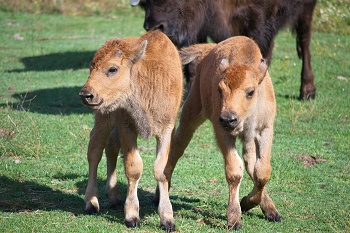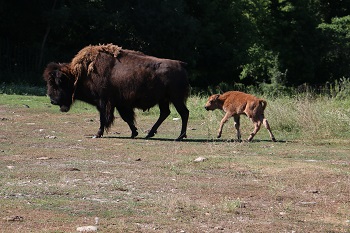Toronto, ON (Monday, August 17, 2015) Two bison calves were successfully born through artificial insemination (AI) on July 21, 2015 and July 28, 2015 at the Toronto Zoo. The births of these male calves are particularly significant as one of the calves is the zoo’s first, second generation artificially inseminated wood bison. His mother is one of six original artificially inseminated wood bison born here at the zoo. In addition, the second calf was conceived from 35 year-old sperm acquired from Elk Island, Alberta in 1980. To our knowledge, this is the longest stored sperm used to produce a successful AI birth in a zoo species.
“This is an excellent example of genetic material used over "time and space": the infusion of genetics into a herd many years after the donor is gone and translocation of genetics between locations," says Dr. Gabriela Mastromonaco, Curator of Reproductive Programs and Research.
The Toronto Zoo houses one of a few reproductive physiology labs in North America that participates in biobanking wildlife species; the process of freezing living cells, such as sperm and embryos, for the purpose of preserving genetic diversity for the future. This is the fifth consecutive year the Toronto Zoo has had wood bison calves born through artificial insemination as part of an ongoing research program.
“We have been working on optimizing artificial insemination techniques in wood bison along with our collaborators at the University of Saskatchewan. This is the fifth year that we have had calves following the insemination of our wood bison females. We have been slowly improving the technique using only cooled sperm in the first two years, followed by frozen-thawed sperm for two years. Once we were able to get calves from frozen-thawed sperm, we felt confident in attempting an insemination with 35 year-frozen sperm," says Dr. Gabriela Mastromonaco.
Toronto Zoo is Canada's national leader in saving wildlife to ensure the rich diversity of nature for future generations. The zoo has been involved in wood bison conservation since 1977 with captive breeding and reintroduction of animals back into the wild. Since that time, efforts from various organizations have resulted in the species being down listed from “endangered” to “threatened” by the International Union of Conservation and Nature (IUCN). On-going disease concerns in remaining wood bison populations continue to threaten this species.



